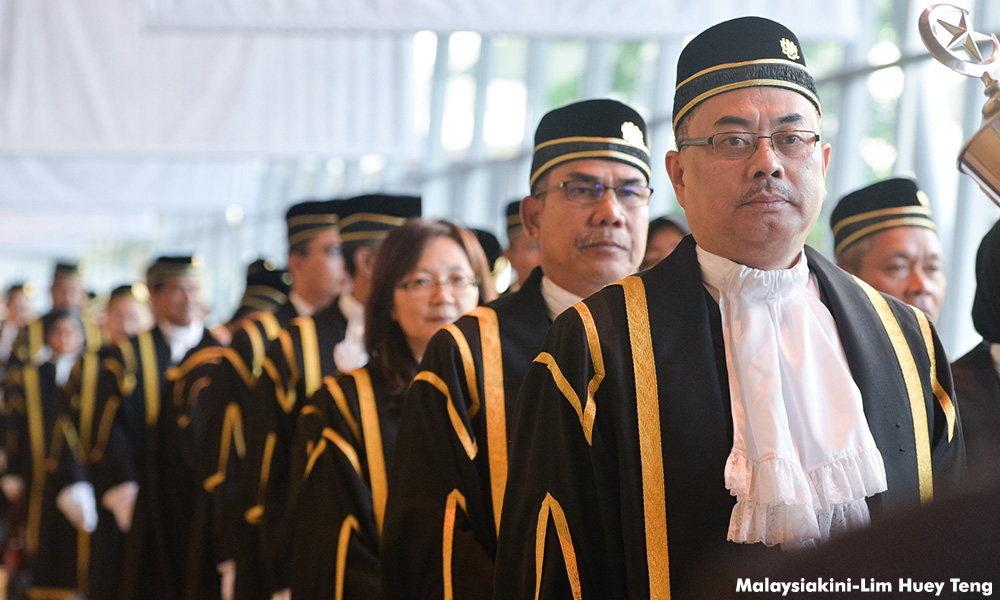
YOURSAY | Harapan must leave behind a lasting legacy. This includes an impartial judiciary.
Vijay47: Recently when a certain person announced that he too would contribute 10 percent of his salary to the Tabung Harapan Malaysia, there was much cheering across the land, waving of flags and chants of "You da man". I shall not comment on that.
And by the same token, do not expect me to come out with words of grateful appreciation now that Chief Justice Mohd Raus Sharif and Court of Appeal president Zulkefli Ahmad Makinudin have tendered their resignation, which strangely takes effect only in just under two months.
The entire episode comes with a thousand questions - why did they accept the appointments in the first place, and more importantly, why are they resigning now?
Where adherence to the law is concerned, their acceptance of the appointments then and resignations now are directly in contradiction with each other.
They cannot have it both ways. Of course, they could now claim that they did so to spare the country further anguish.
Clever Voter: Judicial independence is a must. There must be a clear demarcation between the elected representatives and judiciary, which must uphold fairness, impartiality and justice.
The past regime has erased these boundaries. Judgments smelled of political interference and, worst of all, public confidence in the judiciary fell to an all-time low.
The resignation of two top judges is the right thing but the selection of judges through a proper nomination committee without politicians must be put in place.
Harapan must leave behind a lasting legacy. Sustaining the system involves an impartial judiciary.
Sirach: I don't understand the pillorying of these two judges. Yes, their tenure extensions may not have been carried out in accordance with the strict interpretation of the constitution.
But they were asked by the then-prime minister to continue and they assented. For them to be denigrated solely on that account is unreasonable.
The recent court finding that the prime minister was not a public servant/official did raise eyebrows, but unless it can be shown that the ruling clearly violated statutes, which as far as I know has not been shown, they cannot also be faulted.
To suggest that judges be completely devoid of political bias is as unrealistic as it is impossible.
The appointment of Supreme Court justices in the US is politically charged, where the sitting president recommends to Congress candidates based on their judicial disposition, for example, whether their track records tend more toward conservative or liberal rulings.
So, to expect our judges to be totally neutral is asking a bit much. Only God, as the ultimate judge, is absolutely impartial. Human judges are, well, human.
Redmann: I agree that Article 122(1A) of the Federal Constitution was not ignored or disobeyed when these two additional judges were appointed. Yes, there is no age limit imposed under the said article.
Relying on the letter of the law while abandoning its intent, function, reason and purpose became the inevitable result of the controversy surrounding their appointments.
So, let's not be carried away by the misguided vexatious mantra "rule of the law", when these two judges' appointments allegedly served a political agenda and not the "cause of justice."
Their resignations displayed intellectual honesty simply because they knew what they did when they accepted these appointments.
Unspin: Bukit Gelugor MP Ramkarpal Singh, if the Federal Court were to rule that the appointment of Raus and Zulkefli is constitutional, wouldn't that set a precedent for similar appointments to be made in the future?
Since the two judges have already tendered their resignation, we should accept it and let the matter rest. As the saying goes, "You should be careful what you wish for."
Anonymous 1802761448130592: It's best for the Agong to revoke their appointments, and the sooner this is done, the better.
Accepting their resignations can be interpreted as their appointments being constitutionally correct in the first place.
Vijay47: I, of course, know next to zilch about the legal procedure and implications in respect of the appointment of these persons to their respective positions.
But I would think that since the Agong appointed them, it is he who should revoke the appointment. The two judges do not even have the luxury of resigning.
Another little point perplexes me - if, as suggested, their appointment is withdrawn and thus becomes void ab initio, what becomes of that ritual where when Dr Mahathir Mohamad signed the letter of appointment and oath of office as prime minister, it was countersigned or witnessed by Raus?
Anonymous_1419577444: This is an obsession with form over substance.
In the midst of all this wrangling over what is the correct procedure for this and that, these people missed the matter that is most important - the job that their replacements have to do upon taking office.
Abasir: While I usually agree with Ramkarpal because he is correct in his pronouncements, I must disagree with him on this.
These are unusual times, the high posts in question are occupied by an "illegitimate" pair and there is an urgency to clear the deck if only because there are several matters pending.
The Council of Eminent Persons, whose very existence underscores the abnormality of the country's democracy, has had no choice but to nudge the recalcitrant pair out - despite which we see them sitting tight till July 31.
Mano: "It is a basic hallmark of any democracy that the executive does not interfere in the affairs of the judiciary," Ramkarpal is quoted as saying in the article.
Yes, Ramkarpal. Thank you for saying that. We need clear separation of powers, otherwise the same old thing will happen again. -Mkini



No comments:
Post a Comment
Note: Only a member of this blog may post a comment.